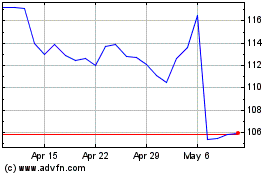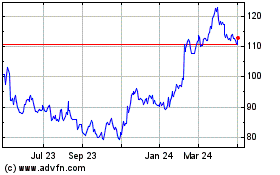Time Warner Talks With Hulu Zero in on Current Seasons
January 31 2016 - 7:40PM
Dow Jones News
Just how much longer should cord-cutters be able to watch
episodes from the current seasons of TV shows on Hulu?
That is one question that has emerged in negotiations between
media giant Time Warner Inc. and Hulu, which have been heating up
lately, according to people familiar with the discussions. The two
sides have been in talks since late last year about Time Warner
buying into the streaming site as a part-owner.
Hulu, whose current owners include Walt Disney Co., 21st Century
Fox and Comcast Corp., offers a smorgasbord of current-season
episodes of broadcast shows such as Fox's "Empire" and ABC's
"Quantico."
That allows Hulu subscribers to catch up on many new shows from
the first episode onward, even late in the season, a key
differentiator from its bigger rivals Netflix Inc. and Amazon.com
Inc., which typically only offer viewing after the end of the first
season, or later.
Time Warner believes that the presence of full, current seasons
on Hulu—or anywhere else outside the bounds of pay-TV—is harmful to
its owners because it contributes to people dropping their pay-TV
subscriptions, or "cutting the cord."
In the discussions about taking a 25% equity stake in Hulu, Time
Warner has told the site's owners that it ultimately wants episodes
from current seasons off the service, at least in their existing
form, although that is not a condition for its investment,
according to the people familiar with the discussions.
As a result, the talks between Hulu's owners and Time Warner are
highlighting a pressing issue for media companies: how to make
their programming available on streaming video services without
undercutting the pay-TV business that continues to generate the
lion's share of their revenue and profit.
The talks reveal the tension at the heart of Hulu for the media
companies who own it: putting their best content on the service
will help it grow and compete with Netflix, but that also could
lure more cord-cutters from pay TV.
"If everybody in the industry is worried about Netflix driving
cord-cutting, shouldn't they be just as worried about Hulu?" asks
Nomura Securities analyst Anthony DiClemente, noting that Hulu
offers many shows a day after they air.
Time Warner, whose stock price has fallen back to around the
level it was at before the company rejected a takeover bid from
21st Century Fox in 2014, is under pressure to show investors it
has a plan to thrive in a TV environment where streaming media is
on the rise. (Until mid-2013, 21st Century Fox and The Wall Street
Journal-owner News Corp were part of the same company.) Time Warner
stock closed at $70.36 in New York on Friday.
Hulu's owners don't have plans to remove current seasons for
now, according to people familiar with their thinking. But longer
term, it is an open question, the people say.
Indeed, Hulu's owners for months have delayed finalizing the
agreement that governs how they license current seasons to Hulu, as
they debated the issue. A two-year licensing agreement that expired
last year required the owners to give Hulu full current seasons of
every show produced by an in-house studio that airs on their
broadcast networks—ABC, NBC and Fox—with only limited exceptions.
The owners have been agreeing to short-term extensions of that
agreement.
Several Wall Street analysts believe a significant part of
Hulu's value and appeal to consumers is tied to its current-season
deals with its owners.
However, Hulu has been adding content beyond those
current-season offerings, striking deals for old seasons of shows
such as "Seinfeld" and original series such as the comedy "Casual."
That has helped reduce the service's reliance on current-season
episodes, which today account for less than 25% of streams on Hulu,
according to people familiar with the matter.
The content investments helped Hulu increase its subscriber base
to about 10 million U.S. subscribers last year, up from 6 million
the previous year. Netflix has about 45 million U.S. users.
Time Warner isn't interested in having full, current-seasons of
shows from its networks, which include TNT and TBS, appear on Hulu.
But the company understands that it would be difficult for Hulu's
owners to pivot their strategy on current episodes overnight,
according to people familiar with the matter.
Long term, Time Warner wants to reshape the subscription online
video marketplace to support pay-television—and, in particular, to
send people to video-on-demand services and "TV Everywhere" apps
tied to pay-TV subscriptions.
Time Warner Chief Executive Jeff Bewkes told analysts in
November that the company was considering holding back the rights
to shows on its networks for longer on its own on-demand platforms
before selling them to services such as Netflix.
One alternative to Hulu's approach is to place current seasons
of shows behind a paywall only accessible to pay TV subscribers.
Hulu already does this for some cable shows such as USA's
"Suits."
Mr. Bewkes has voiced support for versions of this model of Hulu
in the past, according to people familiar with the matter, but it
isn't clear if Time Warner has suggested this approach in its
continuing talks with Hulu.
(END) Dow Jones Newswires
January 31, 2016 19:25 ET (00:25 GMT)
Copyright (c) 2016 Dow Jones & Company, Inc.
Walt Disney (NYSE:DIS)
Historical Stock Chart
From Mar 2024 to Apr 2024

Walt Disney (NYSE:DIS)
Historical Stock Chart
From Apr 2023 to Apr 2024
